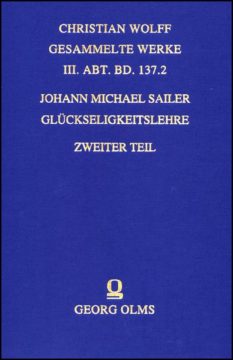Johann Michael Sailer (1751-1832) studierte Philosophie und Theologie an der Universität Ingolstadt und bekleidete dort, nachdem er 1780 das Doktorat der Theologie erlangt hatte, neben seinem Lehrer Benedikt Stattler die zweite Professur für Dogmatik. Doch schon 1781 wurde er als Gegner der Katholischen Aufklärung von der bayerischen Regierung seines Amtes enthoben. Diese Einschätzung sollte sich jedoch bald ändern. Von 1784 bis 1794 und erneut ab 1799 wirkte Sailer im Geist der Aufklärung als Professor für Ethik und Pastoraltheologie an der Universität Dillingen. Seit 1821 war er Mitglied des Regensburger Domkapitels, 1822 wurde er Generalvikar und 1829 Bischof der Diözese Regensburg.
Die Glückseligkeitslehre zeigt, dass Sailer sich als Professor in Dillingen rasch sein neues Betätigungsfeld, die Ethik und Moraltheologie, erschloss. Er möchte mit dem Werk eine Moralphilosophie bieten, die sich – ganz im Geiste Christian Wolffs und der Aufklärung – auf Vernunft-, nicht auf Glaubensgründe stützt, die aber für den christlichen Glauben offen ist. Sie richtet sich nicht nur an Studierende, sondern an alle, die sich für solche Fragestellungen interessieren.
***
Johann Michael Sailer (1751-1832) studied philosophy and theology at the University of Ingolstadt and in 1780, having obtained his doctorate in theology, became second Professor of Dogmatics there alongside his teacher Benedikt Stattler. Only a year later he was removed from his post by the Bavarian authorities as an opponent of the Catholic Enlightenment. However, this opinion of him would soon change. From 1784 to 1794 and again after 1799 Sailer, working in the spirit of the Enlightenment, was Professor of Ethics and Pastoral Theology at the University of Dillingen. In 1821 he became a member of the Cathedral Chapter in Regensburg, becoming Vicar-General in 1822 and Bishop of Regensburg in 1829.
His Doctrine of Blessedness demonstrates that, as Professor at Dillingen, Sailer had quickly mastered his new field of ethics and moral philosophy. He wanted the work to offer a moral philosophy which – in the spirit of Christian Wolff and the Enlightenment – had its foundations in reason rather than faith, but was nonetheless open to Christian faith. It is aimed not just at students but at all who are interested in such matters.
- Veröffentlicht am Mittwoch 20. November 2024 von Olms, Georg
- ISBN: 9783487142760
- 904 Seiten
- Genre: Aufklärung, Hardcover, Philosophie, Renaissance, Softcover
